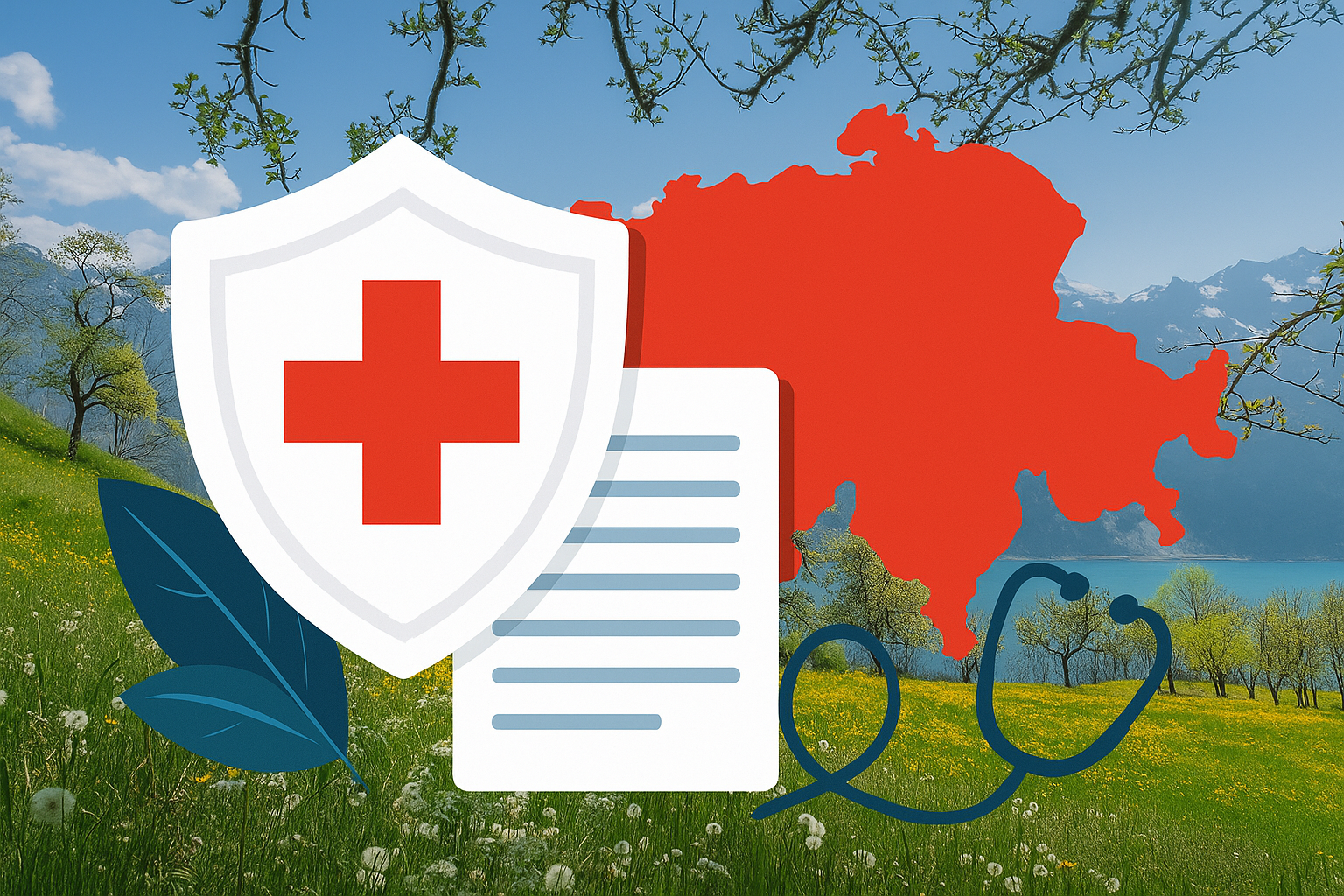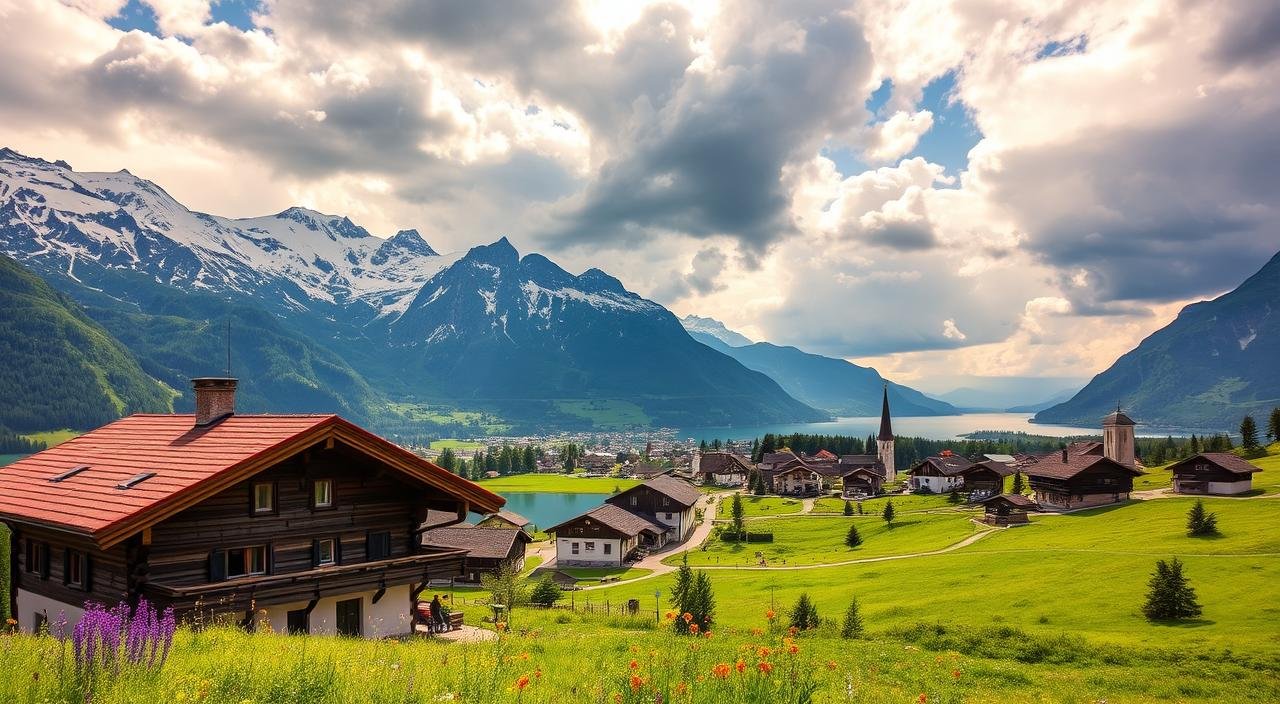I cannot forget the first time I went to Switzerland. I was ecstatic and even made arrangements on how to get the train tickets to the best fondue places in Bern. The thing that I did not anticipate, however, was being ill midway through my trip. An abrupt attack of food poisoning (in something that I never suspected, not even the cheese!) took me to a local clinic. The service? Impressive. The bill? Complete outrage: CHF 500 for a basic check-up and a few pills. I was fortunate to have taken out travel insurance! Without it, I could have been in serious trouble.
I learned a good lesson in this experience that Switzerland travel insurance is not an option. It’s essential.
This is an essential guide because, although I’m not just listing policies and checkboxes, I’m sharing actual, personal advice I wish someone had told me before my trip. It doesn’t matter whether you’re planning your first Swiss adventure, relocating to this beautiful country for work or study, or visiting family, having the right travel insurance can save you from unnecessary stress and expenses. In this guide, I’ll cover everything from what not to do to the biggest mistakes travellers make, the best coverage options you can get, and even how to file your claim effectively.
This does not simply mean information. It is your guide in the end to your local neighbourhood lunch breaks, trips, etc., written in the best interest of your life and safety.
 Why Travel Insurance in Switzerland Is a Must (Local Reality)
Why Travel Insurance in Switzerland Is a Must (Local Reality)
Switzerland is a dream Country! It is clean, orderly, and it is breathtakingly beautiful. However, what most travellers fail to consider before it is too late is the fact that Switzerland is also one of the most costly nations worldwide, healthcare-wise.
I would like to tell you about what occurred to a couple I met on a train trip to Lauterbrunnen. They are Canadians who took their vacation through Europe and just descended the Jungfraujoch. The husband had altitude sickness, and he began feeling dizzy on the way down. At first, it was not dramatic, but it deteriorated rapidly. The crew of the train telephoned a doctor in Interlaken, and he was being treated in an hour. It cost them more than CHF 1,200 on a simple consultation, use of oxygen, and transportation. They lacked insurance coverage. I never forgot the expression on their faces when they perceived that the beautiful mountain memory had just turned out to be an expensive lesson.
That is a story that I could not forget because it is not the exception. Falls on ice-covered tracks, altitude problems, allergic reactions, flight delays, loss of luggage, etc., are more likely to occur than it would seem.
Switzerland travel insurance not only covers emergencies. It is the peace of mind. It entails that you can ride that cable car, learn to snowboard, or go off the beaten track without fear of facing some financial doom lingering over your head.
You do not want to curb yourself when you are visiting one of the most beautiful and wild places in the world, which is Switzerland. Insurance will enable you to say Yes, sure enough.
 What Switzerland Travel Insurance Covers (Detailed Breakdown)
What Switzerland Travel Insurance Covers (Detailed Breakdown)
When people hear travel insurance, most think about medical emergencies. But in Switzerland, where everything from a sandwich to a ski pass costs more than expected, good travel insurance needs to do more than just cover hospital visits. Let’s break down what a comprehensive travel insurance policy for Switzerland should include and why each one matters.
1. Emergency Medical Expenses
This is the non-negotiable. If you fall while hiking or catch a virus, Swiss clinics and hospitals will treat you, but they’ll bill you at Swiss rates.
Real Example: A friend of mine sprained her ankle in Grindelwald and needed an X-ray and crutches. It costs over CHF 900 for a basic ER visit. Her travel insurance covered every cent and even helped her find an English-speaking clinic.
Make sure your policy covers:
- Doctor visits
- Hospital stays
- Prescriptions
- Ambulance or airlift (helicopter rescues are common in the Alps!)
- Emergency dental treatment
2. Trip Cancellation or Interruption
Imagine booking a full Swiss itinerary, scenic trains, cozy hotels, maybe even a Glacier Express seat and then falling sick the night before departure. This coverage refunds non-refundable bookings if your trip is cancelled or cut short due to illness, family emergencies, or other covered reasons.
Personal Note: I once had to cancel a trip to Ticino due to a sudden flu. My insurance refunded my hotel and train costs, no questions asked. It was a relief during a stressful time.
3. Baggage Loss, Theft, or Delay
Even in ultra-safe Switzerland, things happen, especially in major train stations or airports.
Coverage usually includes:
- Lost or stolen luggage
- Delayed baggage (reimbursement for essentials like clothes or toiletries)
- Personal belongings (cameras, laptops, etc.)
Tip: Always report thefts or losses to the police immediately. Your insurance will often require a report.
4. Travel Delays or Missed Connections
Swiss trains are famously punctual, but if you’re connecting from an international flight, delays can snowball. This covers meals, accommodation, and transport during unexpected delays.
5. Personal Liability
This is one most people overlook. If you accidentally damage property (like in an Airbnb) or injure someone (e.g., while skiing), you could be held liable. This coverage protects you legally and financially.
Example: A traveler I met accidentally damaged a rental e-bike in Zurich CHF 1,500 in damages. Their liability coverage saved the day.
6. Adventure Sports Coverage
Planning to ski, snowboard, paraglide, or hike above 2,000 meters? Many base policies don’t include high-risk activities, so double-check this.
Look for policies that include:
- Winter sports
- Mountain trekking
- Water sports
- Climbing or off-piste skiing
What to Watch For:
- Coverage limits (make sure they’re high enough for Swiss costs)
- Exclusions (like pre-existing conditions or high-risk sports)
- 24/7 support (preferably with multilingual assistance)
A good policy should feel like a safety net, not just a checkbox. It’s there to support you, not to leave you hanging when you need help most. Choose wisely, and you’ll explore Switzerland with the confidence you deserve.
 Who Really Needs Travel Insurance in Switzerland?
Who Really Needs Travel Insurance in Switzerland?
Honestly speaking, anyone visiting must take Switzerland travel insurance. Just because it appears on paper that your trip will be safe does not imply that everything will run smoothly. So, let us dissect it by type of traveler so you can see that there is a reason why it will matter to you.
1-2 weeks Short-Term Tourists
You are going to be here to visit the Alps, taste chocolate in Geneva, or cruise Lake Lucerne. It sounds peaceful, and it is until you miss a train, lose your luggage, or get violently sick, and your dream vacation turns into a nightmare.
Ex: A pair of Germans, whom I met in Zurich, had lost their bags for three days because of a delay in transferring them. New clothes and necessities were covered by travel insurance their honeymoon was preserved.
Backpackers and Budget Travellers
Being on a shoestring budget during our travelling, I can tell that a minor medical fee would turn off our entire vacation. It is more likely that as a backpacker, you would want to do such risky activities as hiking, a cheap hostel, and eating street food, and insurance cushions you against the financial shocks.
Adventure Seekers (Skiers, Hikers, Cyclists)
It is a no-brainer. Switzerland is an outdoor playground, and accidents occur. Other than going on flat paths, you should have coverage including sport and mountain rescue.
Personal Experience: I witnessed in Verbier one snowboarder being flown off the slope. One-way flight tickets cost over CHF 5,000.
Digital Nomads or Long-Term Visitors
Even when you are having some form of health insurance back at home, it probably does not work the same way internationally. The Long-term stays (possibly even over 30 days) need a stronger coverage, and in case of being a remote worker or seeking a visa.
Families with Kids
Taking children around? Then you know how easily plans are moulded away by fevers to lost teddy bears. Insurance brings peace of mind to the families.
Regardless of who you are, travelling to Switzerland, it would not be clever, but vital to have Switzerland travel insurance. It is not a paranoia thing. It is all about being ready.
Types of Travel Insurance (Compare and Choose)
Drowning in the sea of travel insurance options in Switzerland is natural, I understand. The variety of the existing options is so big, and they are not equal. However, when you know the key types of coverage, it is not hard to make the right decision. It is a matter of how long you stay, what you are doing, and what peace of mind is to you.
1. Short-Term Single Trip Insurance
This is the most popular among tourists who visit Switzerland for no more than 30-60 days. It typically includes:
- Emergency medical treatment
- Trip cancellation or interruption
- Misplaced baggage or time wastage
- Ordinary personal responsibility
Good for: Business trips, family vacation, casual travels, couples
My Choice: This is an excellent choice when you visit for one or two weeks, as you are covered enough without being placed to spend additional money on your coverage.
2. Multi-Trip or Annual Travel Insurance
Anyway, when you travel to Switzerland or any part of Europe, seriously, a few times a year, you may save money in the long run. The policy has unlimited trips (typically 30 or 45 days per trip).
Who are those good for? Frequent flyers, citizens of the EU who travel to Switzerland on a regular basis, and travel bloggers
Tip: Be sure to include Switzerland in the area covered in your policy (other so-called Europe-only policies omit it).
3. Long-term travel insurance
Staying longer than one month? Perhaps teleworking in a cabin in the mountains or going overseas? In that case, short-term insurance is unlikely to do the trick. You will have to have a more extensive plan, which takes time.
Good For: Digital nomads, expats, slow tourists, long periods of visiting relations
Real Story: One of my friends went on a 6-month sabbatical to Lucerne, only to realise that his general policy was invalid in chronic illnesses. He was required to go up to a policy covering continued treatment and visits to a doctor.
4. Student Travel Coverage
Most universities, as well as visa offices in Switzerland, demand some evidence of travel or health insurance, and in most cases, there are coverage limits.
International students, researchers, and exchange programs are good.
Pro Tip: Some companies will have student plans that are less expensive and also cover academic delays, tuition reimbursement, and mental health.
5. Digital Nomad / Remote Work Coverage
With an increased number of people using their laptops in different parts of the world for work, there has been digital nomad insurance, a specialized cover when they travel. It includes medical treatments, protection of the gear, and even legal assistance.
Popular options: It could be SafetyWing, Genki, or World Nomads; the latter has been flexible, scored very well by customers, and renewed monthly with no problems.
So, Which One Should You Choose?
- Under 30 days (tourist)? → Take a short-term one-trip
- A regular visitor? → Take out an annual multi-trip
- More than a month? → Purchase long-term or expat insurance
- Doing school in Switzerland? → Seek out student-specific plans
- Remote job? → Find a service-oriented supplier
It is important that you tailor your insurance according to your life, not vice versa. Plan in advance, and you will travel with less concern and calmly.
Best Travel Insurance Providers for Switzerland (With Personal Experience)
There’s no shortage of travel insurance providers out there, and if you’ve ever tried comparing them all side by side, you know it can feel like reading fine print in a foreign language. I’ve personally used (and researched) a number of them during my travels in and around Switzerland. Some are fantastic, some are “just okay,” and others are simply not suited for Swiss-level costs.
So here’s a personal breakdown of the top 5 travel insurance providers I trust including who they’re best for and why they work specifically for Switzerland.
1. SafetyWing – Best for Digital Nomads & Long-Term Travellers
I used SafetyWing during my three-month stay in Zürich while working remotely, and it was a game-changer. Their policies are built for digital nomads month-to-month billing, no need to commit upfront, and coverage in 180+ countries, including Switzerland.
What I loved:
- You can buy coverage even after your trip starts
- Includes emergency medical, evacuation, and COVID-19
- Very affordable: around CHF 40–60/month
- Covers travel to the home country for brief periods
Downside: No coverage for high-risk activities (e.g., skiing) unless you add optional adventure sports.
Best For: Digital nomads, remote workers, long-term slow travellers
2. World Nomads – Best for Adventure Travellers
If you’re planning to hike the Alps, ski in Zermatt, or go paragliding in Interlaken, World Nomads is one of the most trusted names out there. I used them when I did a 10-day hiking trip across Graubünden, and their coverage was built for active travellers.
Highlights:
- Strong coverage for adventure sports and gear loss
- Easy online claims process
- Includes trip cancellation, delays, and lost luggage
- Coverage for non-residents and international citizens
Downside: Can be more expensive (around CHF 80–120 for 2 weeks)
Best For: Backpackers, outdoor lovers, solo adventure travelers
3. Allianz Travel – Best for First-Time Visitors & Families
Allianz is a household name in Europe, and their travel insurance plans are very reliable for short-term trips. My parents used Allianz on their visit to Switzerland last year, and when their luggage got delayed for 48 hours, the claims were processed quickly and stress-free.
Why I Recommend It:
- Comprehensive medical and travel protection
- Good multi-language support (including German, French, Italian)
- Customizable plans, with affordable family packages
Downside: Slightly more paperwork than online-first companies
Best For: Tourists, families, older travellers, people who want a big-name provider
4. AXA Travel Insurance – Best for EU Travellers Visiting Switzerland
Many EU citizens visiting Switzerland go with AXA, especially if they already have health insurance in the EU. AXA offers Swiss-compliant Schengen coverage with options to extend and add benefits like ski injury coverage or personal liability.
Pros:
- Excellent customer service in Europe
- Strong reputation for fast reimbursements
- Good integration with Swiss/EU emergency services
Cons: Less flexible for non-EU residents or digital nomads
Best For: EU passport holders, Schengen travellers, frequent visitors
5. Swisscare – Best for Students, Expats, & Visa Applicants
If you’re moving to Switzerland or applying for a residency permit, Swisscare is an approved insurance provider for students and long-stayers. It meets all visa and cantonal requirements, and the prices are fair for the level of coverage.
Why It’s a Solid Pick:
- Tailored for students and expats
- Visa-compliant (Schengen and national long-stay)
- Covers mental health, chronic conditions, and vaccinations
Watch out: Some of the cheaper student plans don’t include high-risk activities unless you add them
Best For: International students, au pairs, exchange programs, long-term expats
My Personal Recommendation?
If you’re staying under 30 days, go with Allianz or World Nomads.
If you’re a remote worker or long-stay traveller like me, SafetyWing is unbeatable for flexibility and price.
And if you’re studying or moving, Swisscare is the local-friendly, visa-ready solution.
How Much Does Travel Insurance Cost? (Real Examples)
Let’s talk numbers because that’s usually the first question people ask me:
How much does travel insurance for Switzerland actually cost?
The short answer? It depends on your age, trip length, activities, and coverage level. But I’ll give you some real estimates from my own trips and those of friends and readers.
Example 1: 1-2 Week Tourist Trip (Age 25-40)
- Basic Plan (Medical + Trip Cancellation): CHF 40–60
- Adventure Coverage Included: CHF 70–100
Best for: Sightseeing, city stays, maybe light hiking
Personal Note: I paid CHF 56 for a 10-day policy with World Nomads when I visited Zermatt. It included medical + skiing coverage, and I thankfully never had to use it, but the peace of mind was worth every franc.
Example 2: 1-Month Stay (Digital Nomad or Slow Travel)
- SafetyWing: CHF 45–55/month (basic, global medical)
- World Nomads (premium): CHF 90–130/month
Best for: Remote workers, long-term explorers, hikers
My Choice: I used SafetyWing for 3 months in Switzerland. It cost me CHF 138 total and covered doctor visits and altitude issues Yes, I learned the hard way that hiking above 2,000 meters hits differently!
Example 3: Family of Four (Two Adults + Two Kids, 10-Day Trip)
- Comprehensive Family Plan (Allianz or AXA): CHF 150–220 total
Best for: Short vacations with little ones
A family I helped last winter chose Allianz for their ski trip to Davos. Their son got a cold, and they were reimbursed for urgent care and meds – no issues, no stress.
Example 4: Student or Visa Applicant (3–6 Months)
- Swisscare Student Plan: CHF 30–45/month
- Visa-Compliant Expat Plan: CHF 60–80/month
Best for: Students, interns, long-term residents
Final Thought:
Switzerland isn’t cheap, but travel insurance doesn’t have to break the bank. Even the most premium coverage costs far less than one emergency clinic visit here.
And more importantly? It gives you the freedom to truly enjoy your trip, without fear of what could go wrong.
Common Travel Insurance Mistakes to Avoid (Real Lessons Learned)
When it comes to Switzerland travel insurance, most people make the same mistakes, and unfortunately, they only realize it when something goes wrong. I’ve seen it happen to friends, travelers I’ve met in Switzerland, and even myself (yep, I’ve made a few of these errors too).
Let me walk you through the most common mistakes to avoid, so you don’t learn the hard way.
1. Choosing the Cheapest Plan Without Reading the Fine Print
I get it, saving money is tempting. But in Switzerland, basic plans often won’t cover much beyond emergencies. They might exclude:
- Mountain rescue
- Winter sports
- Pre-existing conditions
- Personal liability
True Story: A traveler I met in Interlaken broke her wrist while sledding. Her insurance didn’t count sledding as a “covered activity.” She paid CHF 1,800 out of pocket.
Tip: Always check what isn’t covered.
2. Forgetting to Include Adventure Coverage
Switzerland is nature’s playground for skiing, paragliding, hiking, and biking. But most standard insurance won’t cover anything considered risky.
Tip: If your trip involves mountains, sports, or even hiking above 2,000 meters, make sure you’re covered.
3. Buying Insurance Too Late
Many people wait until the last minute or worse, after they’ve already started their trip. Some policies won’t cover trip cancellation or interruption unless you buy them right after booking your trip.
Personal Insight: I once booked a Glacier Express ticket and forgot to activate my travel insurance. When my train was canceled due to snow, I was out CHF 140.
Tip: Buy your insurance as soon as your major bookings are made.
4. Not Bringing Proof of Coverage
If you’re entering on a visa (like a Schengen or student visa), you’ll often need printed proof of insurance that lists:
- Your name
- Valid dates
- Coverage amounts
Trust Tip: Keep both a digital and printed copy with you, especially for airport checks.
Final Advice:
Don’t treat insurance like an afterthought. In Switzerland, a country where peace of mind is part of the culture, travel insurance is just smart planning.
Must-Have Features for a Good Policy (Checklist)
When selecting the travel insurance covering Switzerland, do not take the very first plan you come across. Switzerland is a secure nation, undoubtedly, but it is also a country that is rather costly, particularly in the case of mishaps. What then should be the main object of your search?
This is a list of smart things that a traveller must take (my personal experience, plus talks with other visitors).
1. Medical Coverage (At Least CHF 100,000–CHF 250,000)
Switzerland has one of the finest (and most expensive) health systems in the world. You’ll want:
- Acute Care Intervention
- The expenses of hospital stay and ambulance expenses
- Prescription medication
Local Tip: ER is expensive even without insurance, with the expected costs per visit starting as high as CHF 1,000.
2. Winter Sports & Adventure Coverage
You should have these covered in case you are skiing, snowboarding, hiking high-altitude mountains, or even tobogganing. In most of the exceptions, there are certain activities that are considered risky, and you need an upgrade.
3. Trip Cancellation and Interruption
- To protect yourself when:
- Your plane is cancelled
- Before travelling, you become ill.
An emergency at home makes you leave early. People drop out of college suddenlyAsking you to leave lowers your moraleFeeling ashamed to leave in the middle of the test.
Personal Note: This saved me more CHF800 when I was forced to cancel an excursion to Jungfrau because I had suddenly fallen ill.
4. Misplaced Baggage & Personal Items
Switzerland boasts of fantastic public transportation, yet problems of baggage delays still occur. Select a plan that:
- Insures/Luggage/Delayed luggage
- Refunds for necessities (clothes, toiletries)
- Includes gadgets such as laptops and cameras
5. Personal Liability
This covers you in case you break something or hurt someone by mistake, to avoid any legal claims, and this will not be a mere waste of money, as in case you rent skis, bikes, or a vehicle.
One should always peruse what is excluded and included in the policy. It is not a bargain to have a low-cost plan that does not cover you in the ultimate. Your trip type, activities, as well as lifestyle should be covered by you.
How to File a Claim in Switzerland (Step-by-Step Guide)
Making a travel insurance claim in Switzerland may appear to be a headache, particularly when you happen to be pressed, under the weather, or when something of worth has just happened to go astray. I know what it is like. The last thing that you want is to struggle with when all you ever wanted was a nice stay in the Alps.
However, this is the good news: provided you are aware of the steps and in control, it actually turns out to be an easier thing to go through.
I will give you a little guided tour–just as I give a friend.
Step 1: Keep Calm and Document
In case you are injured or robbed or even have something stolen first thing is your security. As soon as things get settled, begin to collect:
- Doctor/hospital receipts
- On duty, police report (in case it is a theft or an accident)
- Pictures of the site or destruction
Evidence of loss (e.g., baggage tags; airline delay reports)
Self-Help Hint: In Bern, I received a print-out report following a mild allergic reaction! I just scanned and sent it by email later. No drama.
Step 2: Inform your Insurance Company
This should be done as early as possible! Most companies have penalty points for you to report within the time frame of 24 to 72 hours.
You will tend to do this through:
- Web-based claim type (most providers have applications today)
- Email or phone assistance
- Your customer dashboard
Pro Tip: Save the emergency number of your provider and the policy number on your phone.
Step 3: Fill in All the Required Documents
Different insurers possess their checklists, yet most of them desire:
- A medical or police report as proof of the incident
- Expense receipts
- The information about your ID and travel dates
- Reimbursement bank information
Check twice, then send an email! Losing even a single receipt may slow everything down.
Step 4- Be Patient (Follow Up)
Switzerland: The processing of claims can take 5-15 business days. It may take more time, so respond patiently. I have a ski injury claim that went almost three weeks, but I called them, and they had sent out a missing attachment, and in 48 hours, it was paid.
Human Note: Insurance companies do not always do good. However, being organized and calm can actually get it done faster and make the entire process not loom as threatening.
When you see yourself on the other side of the ocean in a moment of health scare or loss it is the emotional burden can be heavy. But when you know how to file a claim and that your insurance does work, then this makes a world of difference. It is not only a question of money. It is the mind’s tranquility and comfort at a time when one needs it the most.
When Travel Insurance Truly Saved Me
My Personal Story
I do not forget this day as if it happened yesterday. It was around the end of October, and a weekend was all I could afford to escape on my own to the Swiss Alps, or more to be precise, Lauterbrunnen. It had been billed as one of those restful vacations: fall foliage, cool breeze, and long journeys in the valley. I had recently switched to working at home and required rest. I was strong, even bulletproof. So, I never really had to make use of my travel insurance, though on each trip I always took it. This time, just in case it should.
I fell during my second day when hiking to Mren and slipped on a wet spot of the path. My ankle turned in a grotesque manner, and I fell heavily on it. Nobody to see, nothing to vibrate to, and the pain was settling in fast. Eventually, I was able to hobble back towards the station, and a local eventually agreed to make a phone call on my behalf.
It was followed by a clinic visit of CHF 1,300, X-rays, painkillers, and a patient who needed to be fitted with a brace. All because of a simple fall.
However, the twist is that I did not mind the bill. It is due to the fact that I had even purchased a SafetyWing policy a week before, to cover my trip. I anticipated stress, forms, and delays when I made the claim. But honestly? It was gliding. I submitted copies of my receipts, the clinic report, and in 10 business days, they have paid me the full refund into my account.
But more than the money, it provided me with peace.
I would be able to concentrate on the recovery. I did not feel lost and humiliated. And now, I could really understand what people mean when they say that travel insurance is the thing you never want to use, yet once you use it, you will be so happy about it.
Why am I sharing this?
Why am I sharing this? Because if you’re still doubting whether Switzerland travel insurance is worth it, take my word it is. Knowing you’re covered allows you to enjoy every moment, without the constant “what if” in the back of your mind.
Since Switzerland is a bit about beauty, peace, and not a fear of what if.
Final Thoughts – Plan Smart, Travel Freely
Switzerland is one of the most breathtaking, peaceful, and inspiring countries in the world — but it’s also a place where unexpected costs can sneak up fast.
I created this guide not just from research, but from real experience, real lessons, and real care. Because I want you to feel what I’ve felt here: completely present, fully alive, and free to explore without fear of “what if.
Whether you’re hiking the Alps, skiing in Zermatt, riding the Glacier Express, or just strolling through Zurich, travel insurance isn’t just paperwork. It’s peace of mind.
So take a few minutes. Choose the right plan. And protect your journey because Switzerland deserves your full attention, so don’t worry.
Now it’s your turn:
Have questions? Drop them in the comments below. Found this guide helpful? Please share it with a fellow traveller. Planning your trip? Use our trusted tools below to find the best insurance fit. Thanks for reading, and from one traveller to another! Welcome to Switzerland. You’re going to love it here.
If this travel insurance guide helped, these next articles are must-reads before your trip:
Cheapest Way to Travel in Switzerland – Learn how to move around Switzerland without breaking the bank.
How to Save Money Travelling in Switzerland – My personal tips to help you cut costs without missing out.
What Language Is Spoken in Switzerland? – A quick guide to understanding the country’s language system so you always feel prepared.
Quick FAQs – Switzerland Travel Insurance
1. Is travel insurance required for Switzerland?
Only if you need a Schengen visa. Otherwise, it’s optional but highly recommended due to high healthcare costs.
2. How much medical coverage do I need?
At least €30,000 (CHF 30,000) for Schengen visas, but ideally CHF 100,000–250,000 for full protection.
3. Does travel insurance cover skiing or hiking?
Only if adventure sports coverage is included. Always check your policy before hitting the slopes or trails.
4. Can I buy travel insurance after arriving in Switzerland?
Yes, some providers like SafetyWing or World Nomads allow this. But cancellation coverage won’t apply retroactively.
5. How much does travel insurance cost for Switzerland?
Usually between CHF 40–100 for short trips, or around CHF 40–60/month for longer stays.
6. What’s the best travel insurance for adventure travelers?
Try World Nomads or Safety Wing! Both are popular with hikers, skiers, and digital nomads.
7. What documents do I need to file a claim?
Receipts, medical or police reports, and proof of travel dates. Submit online through your insurer’s claim portal.














